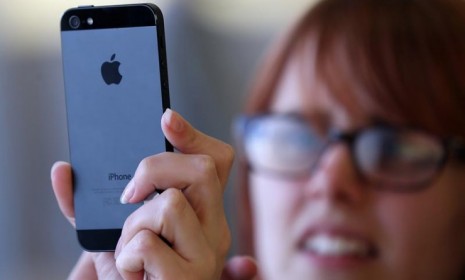4 signs the iPhone is no longer the smartphone king
Android is gobbling up the market and Apple loyalty isn't what it used to be — at least according to recent analyses

A free daily email with the biggest news stories of the day – and the best features from TheWeek.com
You are now subscribed
Your newsletter sign-up was successful
In the eyes of many critics and tech bloggers, Apple's iPhone is still top dog when it comes to handsets. But according to a series of recent polls and editorials, the reigning king of smartphones may be slipping. With the rise of phones that run Android software, which Apple's chief rival Google licenses to partners like Samsung (for its hit Galaxy S series), the eyes of iFans may be starting to wander and their loyalty wavering. Here, four signs the iPhone is losing its mojo:
1. Android outsells the iPhone 5 to 1
Android now owns 75 percent of the smartphone market, according to new numbers from IDC, leaving the iPhone in distant second place with a 15 percent share. Just last quarter, it was 68 percent and 17 percent, respectively. "And you know what blows my mind?" asks Dan Lyons at ReadWrite. Despite the clear cut figures, "tech bloggers keep talking about Apple as a market leader and portraying Android as a plucky underdog." That's outrageous. "When three out of four phones sold worldwide run your operating system, I think it's safe to declare victory."
The Week
Escape your echo chamber. Get the facts behind the news, plus analysis from multiple perspectives.

Sign up for The Week's Free Newsletters
From our morning news briefing to a weekly Good News Newsletter, get the best of The Week delivered directly to your inbox.
From our morning news briefing to a weekly Good News Newsletter, get the best of The Week delivered directly to your inbox.
2. More iPhone users are likely to jump ship
Apple fans are notoriously loyal, but the times could be changing. According to research conducted by Strategy Analytics, 88 percent of U.S. iPhone owners said they're likely to stick with iOS for their next smartphone — a slight decrease from 93 percent last year. In Western Europe, the erosion of loyalty is a bit more drastic, having fallen 13 points from 88 percent in 2011 to 75 percent this year.
3. Press coverage is becoming increasingly negative
At one time, most Apple coverage was overwhelmingly positive. No more. Recent departures by executives like Scott Forstall, former head of iOS, and John Browett, senior vice-president of retail, show that Apple is listening to its critics – namely, those who savaged the widely dissed Apple Maps program. Still, all that negative press may have left Apple fans "reconsidering whether or not they will purchase a new iPhone for their next device," says Strategy Analytics' Paul Brown.
A free daily email with the biggest news stories of the day – and the best features from TheWeek.com
4. Android's design just looks better
"The user interface on iOS looks dated and tired compared to the latest version of Android," says ReadWrite's Lyons, which may "partly explain why Apple just booted the guy who was in charge of running iOS development." The problem: Apple is still trafficking in a fading trend called skeuomorphism, says Austin Carr at Fast Company, a "catch-all term for when objects retain ornamental elements of the past." For instance, the faux-leather stitching on iOS's calendars, bookshelves with wood veneers, fake glass and paper, and brushed chrome. Most designers see skeuomorphism as tacky: "It's visual masturbation," says one former senior user interface designer for Apple. "It's like the designers are flexing their muscles to show you how good of a visual rendering they can do of a physical object. Who cares?" Apple needs to wise up before iPhone fans start seeing the look as passé.